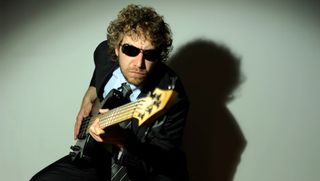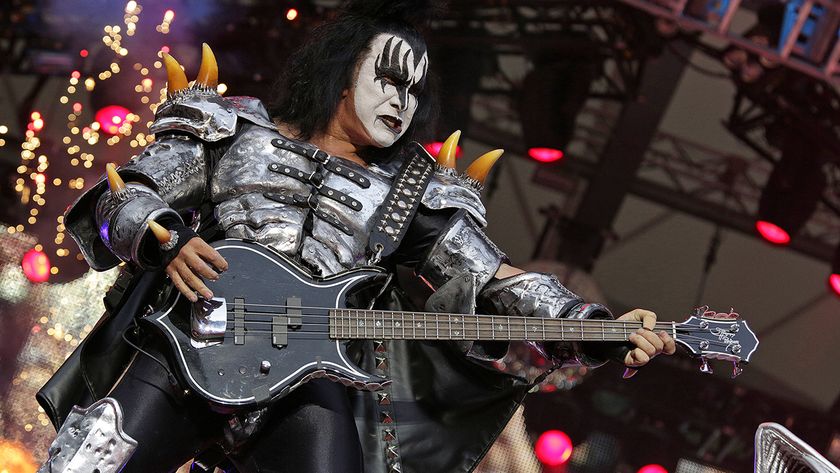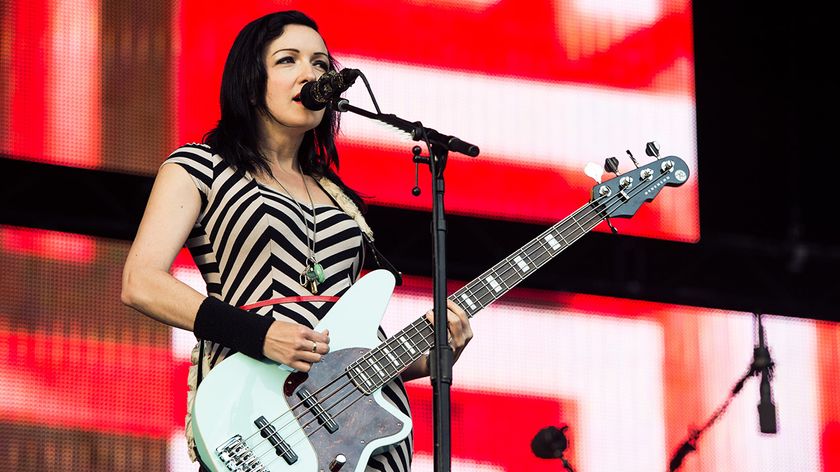
Bassist Alberto Rigoni may not be a household name just yet, but the native of Montebelluna, Italy, has been hard at work crafting a reputation not only as a solo musician, but as a member of prog-rock band TwinsSpirits and electro-pop duo Lady and the BASS.
On his second solo effort, Rebirth, Alberto successfully combines elements of prog-rock fusion with a more traditional hard rock structure. The album shifts from heavy metal ("With All My Forces") to melodic rock (“Story of a Man”) almost seamlessly, showcasing the full breadth of Rigoni's songwriting abilities.
While his bass takes the forefront for most of the album, unlike a lot of solo instrumentalists, he knows when to let a guitar, vocal or even an atmospheric keyboard wash take the spotlight if it will better serve the song
Alberto recently took some time out of his schedule to talk to Guitar World about his latest solo effort.
GUITAR WORLD: How did the dynamic change in terms of writing for a solo album as opposed to in a band setting?
I think that in a band setting, generally the writing process is more difficult or complex because you have to mix and adjust the different tastes and the point of view of each member to reach the final result. In a word, you have to reach the compromise; not in a bad way, but in a meaningful way -- most of the time. This compromise could be avoided if only one member of the band leads the compositions. That happens, for example, in my progressive rock band TwinSpirits, where all the songs are composed by poly-instrumentist Daniele Liverani, although the other musicians have enough freedom to rearrange their own parts.In my solo project, I have absolute freedom. I just follow my own sensitivity and sensibility. From the very beginning of my solo career, I didn’t want to follow any given music genre, relying exclusively on an instinctive way of composing. The result is an extreme variety of music genres, which is my strength, I think (and hope). Solo projects also allow for utilization of the guest artist's musical signature (tone, rhythmic or harmonic/melodic approach). The human ear is often drawn to melodies in the higher register. How did you work to keep the listener's attention with bass parts?Yes, that’s right. It’s easier for the human ear to catch the melodies in the higher register. Generally, in most of the tracks of my solo project, the bass has mainly three roles: rhythm (low register), solos (high register) and arrangements (mid/high register). That helps to keep the listener’s attention and ensure a kind of homogeneous style between the songs.
Talk about your gear on the new album: basses, amps, effects, etc.Rebirth was almost recorded with a six-string Elrick bass, Gold Series. Robert Elrick makes high-end handcrafted instruments with their own tone, very focused on the notes. A couple of tunes were recorded with an F BASS BN6. But recently I moved to Dingwall basses. Stunning! Dingwall basses are multi-scale instruments that use the Novax Fanned Fret System. What does multi-scale mean? For example, on my ABZ 5 string, the low B has a 37-inch scale and the tone is unbelievable, deep and clear at the same time, while the G string is 34 inches. That system allows for a perfect balance between all the strings and also a great tuning, since each string has its own scale. Great balanced tone across the strings and across the fretboard. I also own a Dingwall Prima 6 string. The sound is very elegant with great definition, and it’s amazing for solo stuff.As for the amps, I use Aguilar Amplification. I own the Ag 500 dual-channel head and the DB410. I really like Aguilar tone -- warm and punchy! I also just received the new Tone Hammer 500 and the SL 112: ultra-light but powerful products. I’m tired of heavy stuff.I also use Ernie Ball Slinky strings, HipShot bass Xtender (to drop from B to A), Evidence Audio Cables (Lyric HG for studio sessions and The Forte for live shows), Comfort Strapp, Sonuus b2M and i2M (bass to MIDI converters, very useful for capturing ideas and scoring parts), Peterson Strobo Tuners (StroboSoft, Stomp Classic and StroboRack). Was the recording process analog or digital? Did you use digital effects?The recording process of my bass tracks was digital. The guests recorded in their own studio and I guess they used digital as well. In that way, I could keep their signature sound; I just had to do some minor adjustments to fit with the overall sound. Regarding the digital effects, I used some stuff like Eventide Chorus and some nice delays.How did you go about choosing the guest musicians on the new album? Did you have a list in mind ahead of time, or did you wait until the songs were complete and then decide who'd fit them?When I started composing the album in 2009, I had in mind to invite my favorite musicians, my idols! Which where many, of course. In some cases, the songs were already complete when I decided on the guest who would compliment them (e.g. Michael Manring on “A new Soul”). In other cases, I first decided the guest, then I composed the tune having in mind his playing and musical signature (e.g. “Free” with legendary Porcupine Tree drummer Gavin Harrison).
Get The Pick Newsletter
All the latest guitar news, interviews, lessons, reviews, deals and more, direct to your inbox!
Josh Hart is a former web producer and staff writer for Guitar World and Guitar Aficionado magazines (2010–2012). He has since pursued writing fiction under various pseudonyms while exploring the technical underpinnings of journalism, now serving as a senior software engineer for The Seattle Times.

“You can set up amplifiers and drums to your heart’s content”: Gene Simmons defends paid roadie scheme

“I woke up to a DM from Shirley Manson asking if I'd be interested in the gig. We had never met”: Former Smashing Pumpkins bassist Nicole Fiorentino on how she landed her role in Garbage – with no audition










